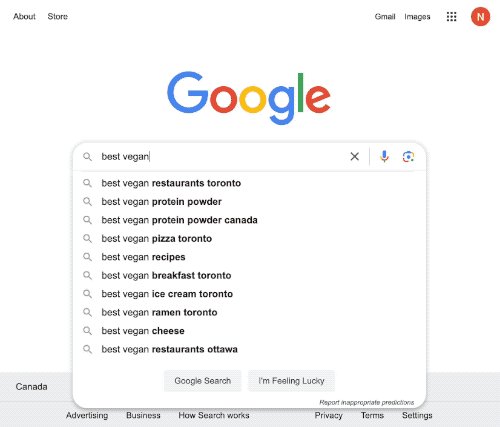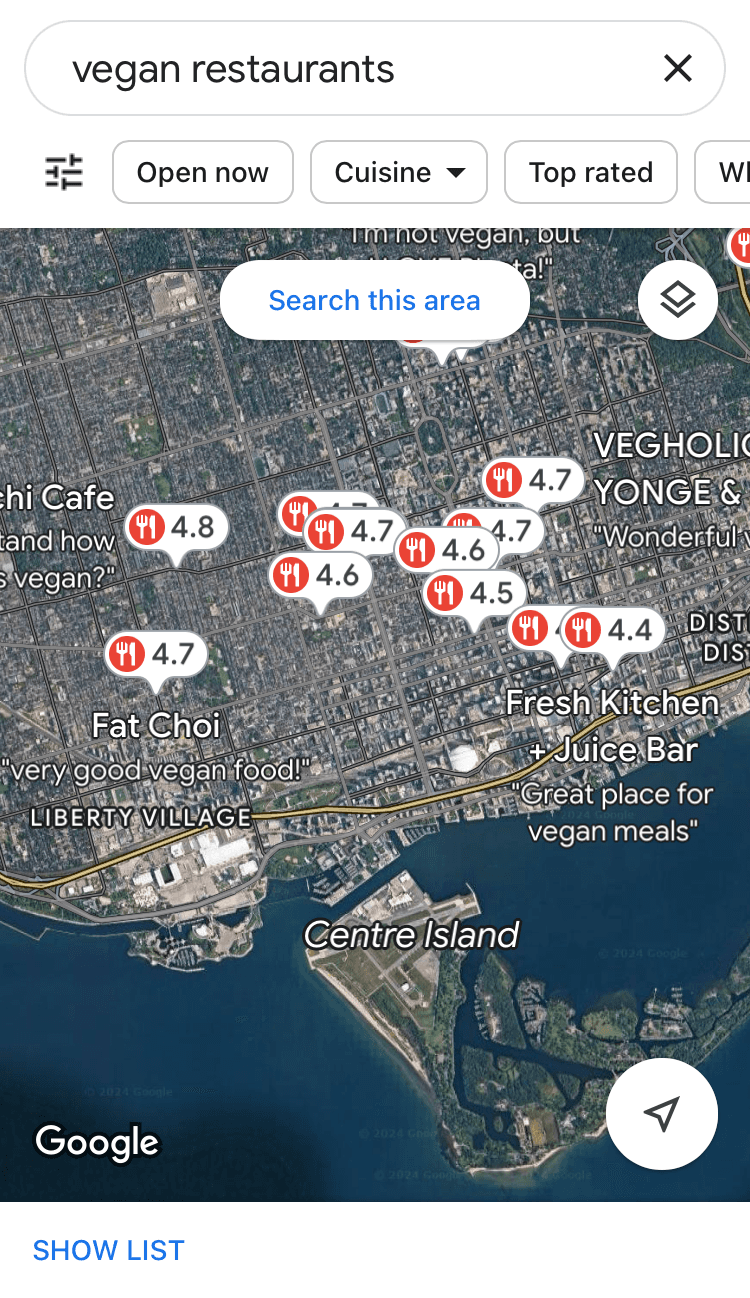Local SEO
Why Local SEO Is Important For Small Businesses
Why Local SEO Is Important For Small Businesses
Why Local SEO Is Important For Small Businesses
Why Local SEO Is Important For Small Businesses
Local SEO helps small businesses become highly visible in local search results, attracting customers looking for products and services in a specific area.
Local SEO helps small businesses become highly visible in local search results, attracting customers looking for products and services in a specific area.
Did you know that inaccurate online information could be driving customers away? If your business isn't showing up correctly in local searches, you may be missing out on foot traffic and potential sales.
Here’s my experience: I wanted to try new restaurants while on vacation, so I turned to Google Maps and searched for “restaurants near me.” Three places had outdated info—and I only found out after visiting each one. Despite being listed as open, two were closed that day and one was under renovation. I felt disappointed because they seemed like nice spots based on the reviews. If only they had shown the correct opening hours, then I could have gone the day before.
This experience got me thinking about the importance of local SEO (Search Engine Optimization) for small businesses in particular. In this article, we’ll explain what local SEO is, why it matters, and share a list of tips to boost your visibility.
What Is Local SEO And Why Is It Important?
Local SEO focuses on optimizing your digital presence to make your business visible in local search results.
Even though the search term “best vegan restaurants” does not specify a location, it wouldn’t make sense to get results from all around the world when you search for that term. Instead, you get results based on where you’re located at the time of searching.
So whenever someone uses keywords relevant to your business while physically nearby, like “best vegan restaurants” or “gyms open 24 hours,” the goal is for you to show up on the first page.
Appearing on the top results increases brand awareness among potential customers nearby, leading more people to your doors. That’s why brick-and-mortar establishments like restaurants, retail stores, and clinics are most likely to benefit from local SEO. It’s also a cost-effective marketing strategy for service providers that operate within a specific geographic area, like plumbers and cleaning services.
The Benefits of Local SEO
Increases Your Visibility
Searchers today expect results to be tailored to their location, even without explicitly stating "near me.” Optimizing for local SEO allows Google and other search engines to match your business with the right keywords and queries.
Here’s how it works: Google’s algorithm ranks local businesses based on three main factors: relevance, distance, and prominence. This information is primarily sourced from your Google Business Profile (GBP).
Your GBP can appear in two prominent locations. First is the Local Pack, which showcases three business listings directly on the search results page.

Based on our experience working with businesses, this is a valuable space that drives a significant amount of traffic especially for popular keywords.
We always aim to rank here, even in industries or areas with high competition.
Your business can also appear in Google Maps, which is the most-used navigation app worldwide. More than just giving directions, it also has exploration features that allow users to discover businesses in a specific area.

PS: Local navigation features are getting increasingly interactive, too! Google is rolling out generative AI features across their products, and that includes Google Maps.
By keeping your GBP complete and up-to-date, you provide Google with valuable data to match your business with relevant searches. This increases your chances of appearing in both local search results and Google Maps.
Now, imagine the potential revenue loss from incorrect business information or an empty profile. Not only is it frustrating for customers, but it also means less visibility for you online.
You could lose a customer by simply not being found, or you could lose that same customer AND leave them with a negative perspective of your brand: both terrible results, simply from not updating your profile.
Builds Trust and Credibility
Think of your business profile as a digital storefront or even another social media profile. It's where potential customers learn about your business, see your hours of operation, read reviews, and get directions. You want to make it as attractive as possible to your target audience.
When it comes to building trust, don’t underestimate the power of having reviews on your profile. Several studies have shown that they influence buying decisions, with 82% of online consumers reading reviews first before deciding on products and services. Positive reviews are more likely to encourage local customers to choose your business over competitors.
More Leads and Foot Traffic
Your business profile works hand-in-hand with your website and social media channels to help meet the needs of searchers. Social media platforms are search engines too. If people find your business on Instagram, Facebook, or TikTok, they’re likely to open up another app to get directions and confirm details.
Keeping your profiles updated across multiple platforms and apps provides a seamless experience for users who want to add your business to their route, no matter what device or platform they’re using.
“I’m a big fan of Local SEO, because it really helps put into context that Search is a behaviour, not a platform. Local SEO touches on different behaviours than just the usual search. It can remind businesses that SEO might sound like something happening only on their website, but really it’s addressing everyday consumer actions that we don’t even notice we’re doing: using multiple platforms to make 1 decision, making a choice based on quick signals, and even judging businesses based on simple accuracy of information.”
— Skyla Valade, CEO of The Deep End Agency on Local SEO in business strategies
Where To Start: Local SEO Basics
“Doing” local SEO isn’t a one-time thing, but an ongoing process. It involves regularly updating profiles, managing reviews, and building citations, among other methods to improve your online presence. Here are essential steps you can take right now to get started:
First, verify if your business has any existing profiles on popular map platforms. Claim ownership if you have not done so yet, or create a new listing if your business isn’t on the map. You can do this through the following links:
Update your profiles to reflect accurate and updated information. It’s extremely important to keep your name, address, and phone number (NAP) consistent across platforms to ensure search engines can accurately index your business.
Add high-quality photos and fill out fields relevant to the nature of your business. For example, if you're managing a restaurant, indicate your opening hours, menu, and a link to your reservation page. If you’re a landscaper, share your sample works, service areas, and a link to your website. It also helps to write a description for your profile that communicates your unique value and sets your business apart from competitors.
Respond to reviews on your profile. Whether positive or negative, taking the time to respond to them professionally builds trust with your audience. It’s a good way to engage directly with customers and address any issues that come up, and it’s a positive indicator for search engines.
Get listed on local directories and websites. Aside from popular sites like TripAdvisor and Yellow Pages, you can also look for platforms that cover your specific area or niche, such as business associations in your city. This process is called citation building. Having more listings and mentions build credibility and increases the chance of ranking higher on search engines.
While following these steps will give you a head start, getting to the top of search results often takes time and consistent effort. For small businesses looking to grow, it’s worth exploring local SEO strategies to complement your marketing efforts and gain a competitive advantage.
Did you know that inaccurate online information could be driving customers away? If your business isn't showing up correctly in local searches, you may be missing out on foot traffic and potential sales.
Here’s my experience: I wanted to try new restaurants while on vacation, so I turned to Google Maps and searched for “restaurants near me.” Three places had outdated info—and I only found out after visiting each one. Despite being listed as open, two were closed that day and one was under renovation. I felt disappointed because they seemed like nice spots based on the reviews. If only they had shown the correct opening hours, then I could have gone the day before.
This experience got me thinking about the importance of local SEO (Search Engine Optimization) for small businesses in particular. In this article, we’ll explain what local SEO is, why it matters, and share a list of tips to boost your visibility.
What Is Local SEO And Why Is It Important?
Local SEO focuses on optimizing your digital presence to make your business visible in local search results.
Even though the search term “best vegan restaurants” does not specify a location, it wouldn’t make sense to get results from all around the world when you search for that term. Instead, you get results based on where you’re located at the time of searching.
So whenever someone uses keywords relevant to your business while physically nearby, like “best vegan restaurants” or “gyms open 24 hours,” the goal is for you to show up on the first page.
Appearing on the top results increases brand awareness among potential customers nearby, leading more people to your doors. That’s why brick-and-mortar establishments like restaurants, retail stores, and clinics are most likely to benefit from local SEO. It’s also a cost-effective marketing strategy for service providers that operate within a specific geographic area, like plumbers and cleaning services.
The Benefits of Local SEO
Increases Your Visibility
Searchers today expect results to be tailored to their location, even without explicitly stating "near me.” Optimizing for local SEO allows Google and other search engines to match your business with the right keywords and queries.
Here’s how it works: Google’s algorithm ranks local businesses based on three main factors: relevance, distance, and prominence. This information is primarily sourced from your Google Business Profile (GBP).
Your GBP can appear in two prominent locations. First is the Local Pack, which showcases three business listings directly on the search results page.

Based on our experience working with businesses, this is a valuable space that drives a significant amount of traffic especially for popular keywords.
We always aim to rank here, even in industries or areas with high competition.
Your business can also appear in Google Maps, which is the most-used navigation app worldwide. More than just giving directions, it also has exploration features that allow users to discover businesses in a specific area.

PS: Local navigation features are getting increasingly interactive, too! Google is rolling out generative AI features across their products, and that includes Google Maps.
By keeping your GBP complete and up-to-date, you provide Google with valuable data to match your business with relevant searches. This increases your chances of appearing in both local search results and Google Maps.
Now, imagine the potential revenue loss from incorrect business information or an empty profile. Not only is it frustrating for customers, but it also means less visibility for you online.
You could lose a customer by simply not being found, or you could lose that same customer AND leave them with a negative perspective of your brand: both terrible results, simply from not updating your profile.
Builds Trust and Credibility
Think of your business profile as a digital storefront or even another social media profile. It's where potential customers learn about your business, see your hours of operation, read reviews, and get directions. You want to make it as attractive as possible to your target audience.
When it comes to building trust, don’t underestimate the power of having reviews on your profile. Several studies have shown that they influence buying decisions, with 82% of online consumers reading reviews first before deciding on products and services. Positive reviews are more likely to encourage local customers to choose your business over competitors.
More Leads and Foot Traffic
Your business profile works hand-in-hand with your website and social media channels to help meet the needs of searchers. Social media platforms are search engines too. If people find your business on Instagram, Facebook, or TikTok, they’re likely to open up another app to get directions and confirm details.
Keeping your profiles updated across multiple platforms and apps provides a seamless experience for users who want to add your business to their route, no matter what device or platform they’re using.
“I’m a big fan of Local SEO, because it really helps put into context that Search is a behaviour, not a platform. Local SEO touches on different behaviours than just the usual search. It can remind businesses that SEO might sound like something happening only on their website, but really it’s addressing everyday consumer actions that we don’t even notice we’re doing: using multiple platforms to make 1 decision, making a choice based on quick signals, and even judging businesses based on simple accuracy of information.”
— Skyla Valade, CEO of The Deep End Agency on Local SEO in business strategies
Where To Start: Local SEO Basics
“Doing” local SEO isn’t a one-time thing, but an ongoing process. It involves regularly updating profiles, managing reviews, and building citations, among other methods to improve your online presence. Here are essential steps you can take right now to get started:
First, verify if your business has any existing profiles on popular map platforms. Claim ownership if you have not done so yet, or create a new listing if your business isn’t on the map. You can do this through the following links:
Update your profiles to reflect accurate and updated information. It’s extremely important to keep your name, address, and phone number (NAP) consistent across platforms to ensure search engines can accurately index your business.
Add high-quality photos and fill out fields relevant to the nature of your business. For example, if you're managing a restaurant, indicate your opening hours, menu, and a link to your reservation page. If you’re a landscaper, share your sample works, service areas, and a link to your website. It also helps to write a description for your profile that communicates your unique value and sets your business apart from competitors.
Respond to reviews on your profile. Whether positive or negative, taking the time to respond to them professionally builds trust with your audience. It’s a good way to engage directly with customers and address any issues that come up, and it’s a positive indicator for search engines.
Get listed on local directories and websites. Aside from popular sites like TripAdvisor and Yellow Pages, you can also look for platforms that cover your specific area or niche, such as business associations in your city. This process is called citation building. Having more listings and mentions build credibility and increases the chance of ranking higher on search engines.
While following these steps will give you a head start, getting to the top of search results often takes time and consistent effort. For small businesses looking to grow, it’s worth exploring local SEO strategies to complement your marketing efforts and gain a competitive advantage.
Did you know that inaccurate online information could be driving customers away? If your business isn't showing up correctly in local searches, you may be missing out on foot traffic and potential sales.
Here’s my experience: I wanted to try new restaurants while on vacation, so I turned to Google Maps and searched for “restaurants near me.” Three places had outdated info—and I only found out after visiting each one. Despite being listed as open, two were closed that day and one was under renovation. I felt disappointed because they seemed like nice spots based on the reviews. If only they had shown the correct opening hours, then I could have gone the day before.
This experience got me thinking about the importance of local SEO (Search Engine Optimization) for small businesses in particular. In this article, we’ll explain what local SEO is, why it matters, and share a list of tips to boost your visibility.
What Is Local SEO And Why Is It Important?
Local SEO focuses on optimizing your digital presence to make your business visible in local search results.
Even though the search term “best vegan restaurants” does not specify a location, it wouldn’t make sense to get results from all around the world when you search for that term. Instead, you get results based on where you’re located at the time of searching.
So whenever someone uses keywords relevant to your business while physically nearby, like “best vegan restaurants” or “gyms open 24 hours,” the goal is for you to show up on the first page.
Appearing on the top results increases brand awareness among potential customers nearby, leading more people to your doors. That’s why brick-and-mortar establishments like restaurants, retail stores, and clinics are most likely to benefit from local SEO. It’s also a cost-effective marketing strategy for service providers that operate within a specific geographic area, like plumbers and cleaning services.
The Benefits of Local SEO
Increases Your Visibility
Searchers today expect results to be tailored to their location, even without explicitly stating "near me.” Optimizing for local SEO allows Google and other search engines to match your business with the right keywords and queries.
Here’s how it works: Google’s algorithm ranks local businesses based on three main factors: relevance, distance, and prominence. This information is primarily sourced from your Google Business Profile (GBP).
Your GBP can appear in two prominent locations. First is the Local Pack, which showcases three business listings directly on the search results page.

Based on our experience working with businesses, this is a valuable space that drives a significant amount of traffic especially for popular keywords.
We always aim to rank here, even in industries or areas with high competition.
Your business can also appear in Google Maps, which is the most-used navigation app worldwide. More than just giving directions, it also has exploration features that allow users to discover businesses in a specific area.

PS: Local navigation features are getting increasingly interactive, too! Google is rolling out generative AI features across their products, and that includes Google Maps.
By keeping your GBP complete and up-to-date, you provide Google with valuable data to match your business with relevant searches. This increases your chances of appearing in both local search results and Google Maps.
Now, imagine the potential revenue loss from incorrect business information or an empty profile. Not only is it frustrating for customers, but it also means less visibility for you online.
You could lose a customer by simply not being found, or you could lose that same customer AND leave them with a negative perspective of your brand: both terrible results, simply from not updating your profile.
Builds Trust and Credibility
Think of your business profile as a digital storefront or even another social media profile. It's where potential customers learn about your business, see your hours of operation, read reviews, and get directions. You want to make it as attractive as possible to your target audience.
When it comes to building trust, don’t underestimate the power of having reviews on your profile. Several studies have shown that they influence buying decisions, with 82% of online consumers reading reviews first before deciding on products and services. Positive reviews are more likely to encourage local customers to choose your business over competitors.
More Leads and Foot Traffic
Your business profile works hand-in-hand with your website and social media channels to help meet the needs of searchers. Social media platforms are search engines too. If people find your business on Instagram, Facebook, or TikTok, they’re likely to open up another app to get directions and confirm details.
Keeping your profiles updated across multiple platforms and apps provides a seamless experience for users who want to add your business to their route, no matter what device or platform they’re using.
“I’m a big fan of Local SEO, because it really helps put into context that Search is a behaviour, not a platform. Local SEO touches on different behaviours than just the usual search. It can remind businesses that SEO might sound like something happening only on their website, but really it’s addressing everyday consumer actions that we don’t even notice we’re doing: using multiple platforms to make 1 decision, making a choice based on quick signals, and even judging businesses based on simple accuracy of information.”
— Skyla Valade, CEO of The Deep End Agency on Local SEO in business strategies
Where To Start: Local SEO Basics
“Doing” local SEO isn’t a one-time thing, but an ongoing process. It involves regularly updating profiles, managing reviews, and building citations, among other methods to improve your online presence. Here are essential steps you can take right now to get started:
First, verify if your business has any existing profiles on popular map platforms. Claim ownership if you have not done so yet, or create a new listing if your business isn’t on the map. You can do this through the following links:
Update your profiles to reflect accurate and updated information. It’s extremely important to keep your name, address, and phone number (NAP) consistent across platforms to ensure search engines can accurately index your business.
Add high-quality photos and fill out fields relevant to the nature of your business. For example, if you're managing a restaurant, indicate your opening hours, menu, and a link to your reservation page. If you’re a landscaper, share your sample works, service areas, and a link to your website. It also helps to write a description for your profile that communicates your unique value and sets your business apart from competitors.
Respond to reviews on your profile. Whether positive or negative, taking the time to respond to them professionally builds trust with your audience. It’s a good way to engage directly with customers and address any issues that come up, and it’s a positive indicator for search engines.
Get listed on local directories and websites. Aside from popular sites like TripAdvisor and Yellow Pages, you can also look for platforms that cover your specific area or niche, such as business associations in your city. This process is called citation building. Having more listings and mentions build credibility and increases the chance of ranking higher on search engines.
While following these steps will give you a head start, getting to the top of search results often takes time and consistent effort. For small businesses looking to grow, it’s worth exploring local SEO strategies to complement your marketing efforts and gain a competitive advantage.


